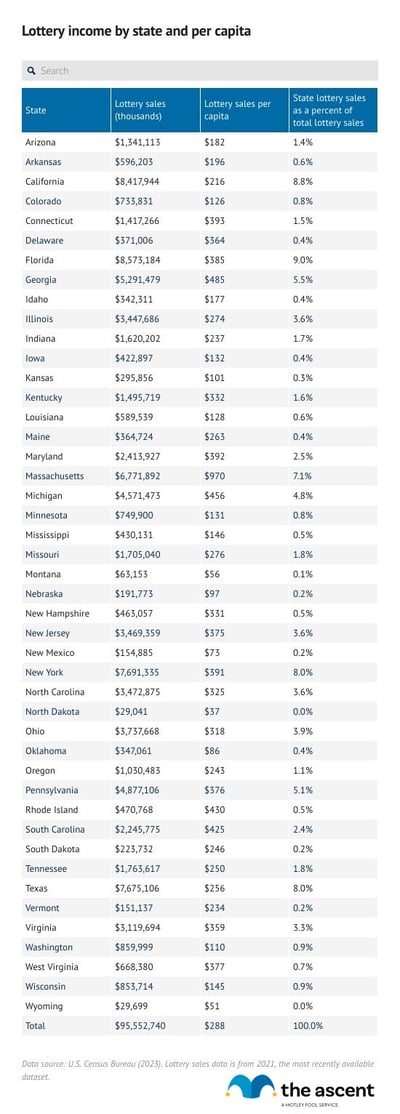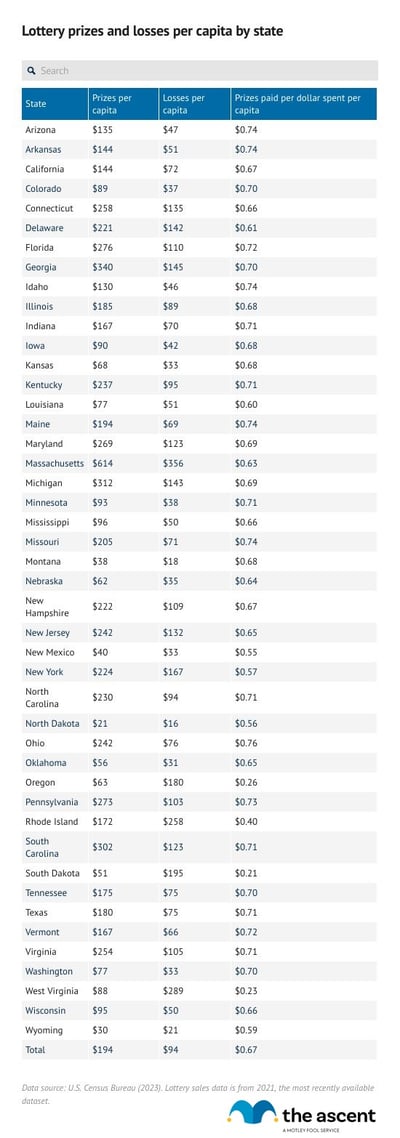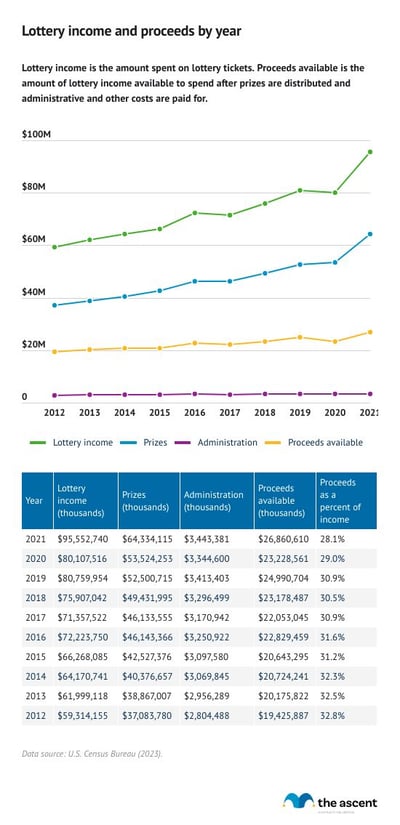Lottery Statistics and Revenue by State
KEY POINTS
- Total lottery spending: Americans spent approximately $97.8 billion on lottery tickets in 2022.
- Lottery spending per capita: Americans spent $392 per capita in 2022 on lottery tickets.
- Lottery spending by state: Massachusetts residents spent $1,037 per capita in 2022 on lottery tickets, more than $400 more than any other state. North Dakota residents spent the least amount per capita that year among states that have a lottery, just $47.
With jackpots exceeding $1 billion, playing the lottery can seem like an enticing potential shortcut to never again being financially burdened. Unfortunately, the odds of winning billions are remote -- 1 in 292 million for the Powerball jackpot -- and players are more likely to lose their cash than win even small prizes.
Those odds haven't stopped Americans from trying their luck, however. Americans shelled out nearly $97.8 billion on state lottery tickets in 2022. That earned a prize payout of $65.2 billion, but that's not evenly distributed among the millions of bettors estimated to play the lottery each year.
Motley Fool Money has broken down lottery revenue by state, prize payouts and losses per capita in each state, and more.
Lottery income by state and per capita
Americans spent $97.8 billion on lottery tickets in 2022, according to the most recent data from the U.S. Census Bureau.
That comes out to $392 spent on lottery tickets per capita that year, although in reality, a small minority of Americans who are consistent players make up the majority of lottery ticket spending. The most recent polling data shows that roughly 50% of Americans buy a lottery ticket at least once a year and the majority of those only play rarely, when jackpots are enormous.
New York brought in the most lottery sales in 2022, roughly $8.87 billion. California raked in $8.85 billion, while Florida counted $8.8 billion. Texas was the only other state with lottery income above $8 billion, making $8.3 billion.
Massachusetts, despite its relatively small population, had the fifth-highest lottery revenue: $5.86 billion. Massachusetts Lottery Executive Director Mark William Bracken has suggested that one reason the Bay State may punch above its weight, in terms of lottery sales, is due to residents of neighboring states hopping across the border into Massachusetts to take advantage of bigger payouts for the same prices they would pay in their home state.
Massachusetts residents also have among the highest median household incomes in the country, which means they may have more disposable income to spend on lottery tickets.

Lottery prize winnings and losses per capita by state
Massachusetts residents earn $764 in lottery winnings per capita, more than $300 more than any other state. In practice, those winnings are not spread equally among bettors, but are taken home by the sliver of lottery players who are lucky enough to win big.
Massachusetts also has the fifth-highest loss on lottery tickets per capita, $274. The state where residents lose the most is Rhode Island, with a lottery loss per capita of $407.
In no state does prizes paid out exceed lottery spending. Missouri and Virginia have the highest prizes paid per dollar spent per capita, at $0.75.
Here’s a full breakdown of the lottery payout per state per capita. Note that this is not the same as the average lottery winnings per winner.

Lottery income and revenue over time
States took in a record $97.8 billion in lottery sales, paid out $65.2 billion in prizes, and had $28.3 billion in proceeds available, in 2022, the most recent year for which data is available. Those are all record highs.
Lottery sales jumped $15.4 billion from 2020 to 2021, the largest increase recorded. Prizes grew by $10.8 billion and income available for states to spend increased by $3.4 billion. Despite that, states have struggled to grow the percent of sales they have available to spend.

How much do states earn from lottery sales?
In 2022, lottery proceeds -- revenue from lottery sales minus prizes paid and administrative costs associated with running the lottery -- accounted for 2% of total state taxes collected, among the 47 states that run lotteries.
Lottery proceeds accounted for more than 7% of state tax revenue in West Virginia, South Dakota, and Rhode Island. On the other end of the spectrum, money from the lottery made up just 0.1% of North Dakota's tax revenue in 2022.
On average, lottery proceeds make up 2.2% of state revenue.
Is playing the lottery worth it?
Playing the lottery may appear to be a quick way to get rich, but it's not a wise investment given that the odds of winning the jackpot are usually one in hundreds of millions. Even if you're feeling lucky, it's extremely unlikely you'll win.
Instead of buying lottery tickets in hopes of securing a huge windfall, it's possible to channel that money into products and assets that can increase in value without an aspect of luck. The best high-yield savings accounts offer competitive interest rates that will grow account balances without needing to gamble, for example. Investing through the best brokers offers more upside than savings accounts, albeit with risks.
Not only can the financial costs of playing the lottery add up, it can also take an emotional and psychological toll. On the other hand, money in a high-yield savings account is secured and protected, and other products like CDs and bonds are either no-risk or relatively low-risk, low-worry options to grow wealth.
FAQs
-
The odds of winning the Powerball jackpot are 1 in 292 million. More specifically, 1 in 292,201,338, according to Powerball.
Experts say it's more likely to be struck by lightning once than to win the Powerball, even if you played every drawing during a lifetime.
-
About 50% of American adults buy a lottery ticket each year, according to experts and a Gallup poll most recently conducted in 2016. Based on that survey, about 162 million people would have bought lottery tickets that year.
Academics say that most people who buy lottery tickets do so only when jackpots are enormous. Most spending on lottery tickets is done by 20% to 30% of players that regularly buy tickets. Only a fraction of that percentage actually wins.
-
These are the five largest lottery jackpots won:
- $2.04 billion, Powerball, Nov. 8, 2022.
- $1.586 billion, Powerball, Jan. 13, 2016.
- $1.58 billion, Mega Millions, Aug. 8, 2023.
- $1.537 billion, Mega Millions, Oct. 23, 2018.
- $1.35 billion, Mega Millions, Jan. 13, 2023.
-
Lottery winnings are taxed by the IRS and most states as income, which means big winners are placed in the highest tax brackets. Non-monetary prizes, like a car or house, are taxed as income at fair market value.
Sources
- Associated Press (2023). "What are the 10 largest US lottery jackpots ever won?"
- Gallup (2016). "About Half of Americans Play State Lotteries."
- National Public Radio (2023). "Here's who really wins and loses in American lotteries."
- Powerball (2023). "Powerball prize chart."
- U.S. Census Bureau (2024). "2022 Annual Survey of State Government Finances Tables: Income and Apportionment of State-Administered Lottery Funds: 2022."
- U.S. Census Bureau (2024). "State Government Tax Tables."
Our Research Expert
We're firm believers in the Golden Rule, which is why editorial opinions are ours alone and have not been previously reviewed, approved, or endorsed by included advertisers. Motley Fool Money does not cover all offers on the market. Motley Fool Money is 100% owned and operated by The Motley Fool. Our knowledgeable team of personal finance editors and analysts are employed by The Motley Fool and held to the same set of publishing standards and editorial integrity while maintaining professional separation from the analysts and editors on other Motley Fool brands. Terms may apply to offers listed on this page.